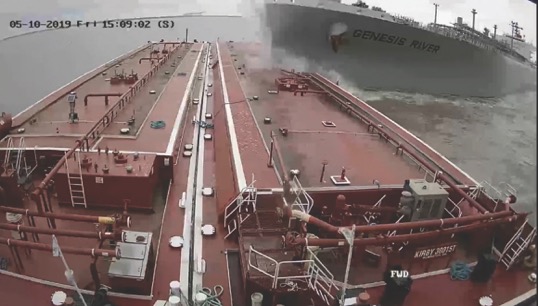US National Transportation Safety Board (NTSB) calls for measures to reduce confined channel risk
30 April 2021

The US National Transportation Safety Board (NTSB) has called for new measures to reduce the risks of operating large ships in confined channels – highlighted by the Ever Given containership's grounding in the Suez Canal.
In a report on a collision between the 54,149dwt liquefied gas carrier Genesis River and a tank barge in the Houston Ship Channel in May 2019, the NTSB warns of the problems posed by speed and hydrodynamic effects in narrow waterways.
Damage and clean-up costs totalling more than US$15m were caused when the Panama-flagged gas tanker collided with the barge, causing a spill of almost half a million gallons of reformate, a gasoline blending stock.
NTSB investigators concluded that a decision by the gas tanker's pilot to transit at 'sea speed' – around 12 knots – had increased the hydrodynamic effects of the channel banks and resulted in the ship trimming further down by the bow. This had reduced his ability to maintain control of the ship after meeting another deep-draft vessel, the 58,159dwt gas carrier BW Oak, and resulted in the Genesis River sheering across the channel toward the towed barge.
'Transiting a narrow channel at or near a vessel's maximum speed provides little room for error and little ability to increase propeller wash over the rudder to recover if control is lost,' the report points out.
The report examines the impact of a range of hydrodynamic factors, including bank cushion and suction, squat and trim, ship-to-ship interaction, and dynamic path stability and refers to a number of similar incidents in the Houston Ship Channel over the past 30 years.
Investigators said Genesis River had sheered to port after passing the BW Oak and the yawing moments and side forces this caused, together with the increasing bank effects on the starboard side, overwhelmed the rudder, with the ship being forced back towards the barge tow.
The NTSB notes that the pilot had asked for the ship's radars to be put on standby and the ECDIS to be switched off to prevent distraction from the closest point of approach alarms.
However, it determined that while this had 'deprived the bridge team of the critical tools with which to monitor the pilots' actions and ensure that the vessel transited safely, the status of this equipment was not a factor in the accident'.
The report says the total stopping time required to bring Genesis River to a complete stop from its speed of 12 knots would have been more than seven minutes, but dropping the anchors or initiating emergency full astern would not have prevented the accident.
The NTSB recommended that pilots should avoid transiting large vessels at sea speed in the lower Houston Ship Channel and avoid any passing arrangements between wide-beam, deep-draught vessels in the northern and southern terminuses of the Bayport Flare. Large vessels such as Genesis River should be 'sufficiently trimmed' by the stern to increase manoeuvring ability, it added.
The NTSB also repeated a recommendation for the US Coast Guard to periodically review each of the 12 vessel traffic service areas and seek input to identify areas of increased vessel conflicts or accidents that could benefit from the use of routing or other special measures.
Tags
More articles
Target health and safety measures by rank, BMJ advises
The shipping industry needs to adopt targeted health and safety strategies to combat rank-specific accidents and medical conditions, a new report has warned.
EMSA reports positive findings in its annual causalities and incidents report
The European Maritime Safety Agency (EMSA) has released its preliminary annual casualties and incidents report for 2020, which has found a reduction of 18% in the total number of casualties compared with 2019.
